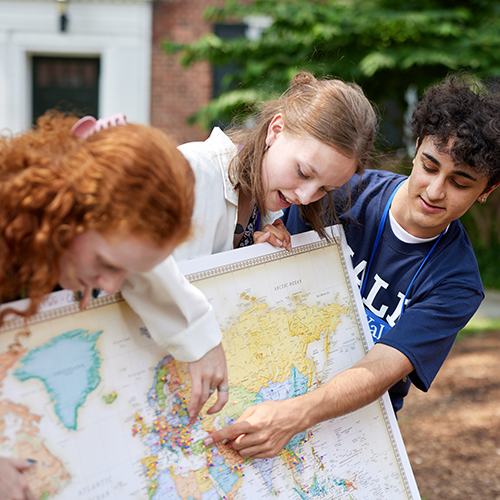
I took a seat in a WALL53 auditorium chair. One hundred and forty-nine people surrounded me; out of these, I knew roughly fifteen. Two days into YYGS session II, it was time for our first lecture: The Trolley Problem. I knew this consisted of a question regarding moral philosophy: would one be willing to save five people standing on the main train track if it meant pulling a lever and deviating the train into a second track, in which one person was standing? Confidently, I looked around with my conviction that I’d undoubtedly pull the lever and sacrifice one person, simply because saving five lives is better than just one.
It only took five minutes for me to learn that this perspective was something called “utilitarian”; it took less than ten to know that half the people in the room had a different solution. Perhaps a bit disconcerted, I shuffled in my seat, wondering how others could consider something different than saving five. In a moment, another suggestion else came up: killing all involved in the scenario; I was borderline lost. My inner voice kept holding onto my initial resolution, I needed to pull the lever, yet, other one hundred and forty-nine voices kept infiltrating my brain. Were they right? “Sacrifice yourself”, another voice said.
I sat in utter shock attempting to interiorize the events in the wooden room. Our lecturer went on presenting other variants of the moral question; is it acceptable to sacrifice one and save the majority? Again, multiple hands were raised, and multiple voices were heard; each one with a different tone and ring to it; each one with a different suggestion. Some proposed manipulating your brain into ignoring the problem. Others, to not intervene due to fate’s path. I felt the walls closing in on me, and black thread being tied in knots in the air, dragging me along ideas I never thought of facing. However, even within opinions that seemed to contradict themselves when answering different cases, there seemed to be a prevalent compass that led everything: the yearning for an answer.
And in that moment, I met the beauty of humanity. All went calm. My confusion and knotted strain washed away when I witnessed the beauty of the humanities. Because this was it: there was never a single answer. I’d heard before of the different perspectives that were bound to arise after a philosophical question, and of the opinions I’d get to meet in a global program, but now I was genuinely living diversity. More so, diversity of a hunger for knowledge. I thought to myself, “we’re all from over 150 different countries, how come we’re on the same train to get an answer?”. I realized my bewilderment wasn’t about the trolley problem; it was about the varied tracks we were all striving to take, and how all of us were together, all one hundred and fifty breaths, voices; every railway crossing over each other, but sticking to personal directions. And even more so, that was alright.
I acknowledged I was glad that I’d encountered the crossover; ideas overlapping, but never getting lost. I was glad that, lecture over, I walked out knowing the personal tracks of the people in the auditorium. I was glad that, the fifteen people I’d met, became fifty people I knew, because I knew what they thought. I was glad that I thought I should pull the lever. I was glad others hadn’t. I was glad we were all absurd humans, looking for an answer in a world that has none. Throughout the YYGS experience, I was glad, all along, knowing that we would all come together to engage in a world in which the trolley problem was only a scenario, and the world, human.
Author Details:
María Vieytez
Literature, Philosophy & Culture
El Salvador